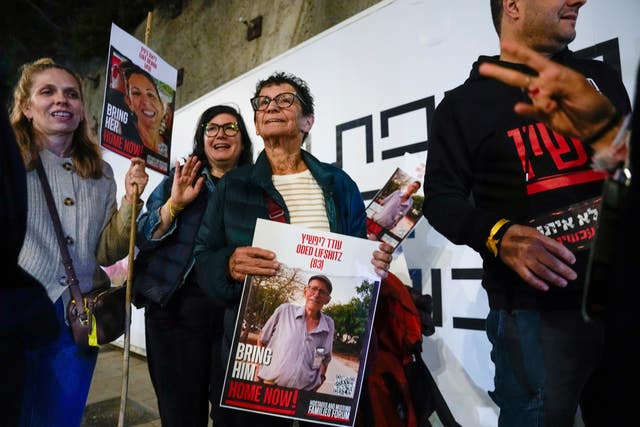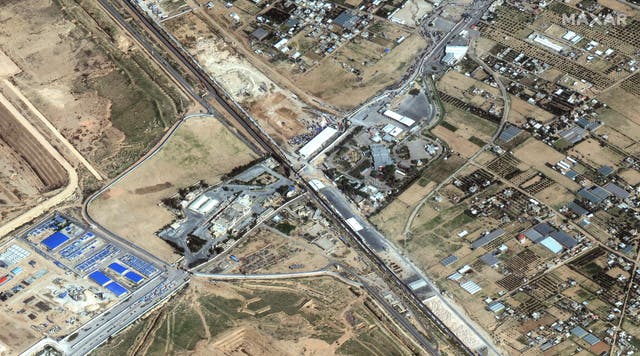Mediators look to extend truce in Gaza on final day

International mediators are working to extend the truce in Gaza, in the hope that the territory’s Hamas rulers will keep freeing hostages in return for the release of Palestinian prisoners and further respite from Israel’s air and ground offensive.
The ceasefire is due to expire within a day, otherwise.
Israel has welcomed the release of dozens of hostages in recent days and said it will maintain the truce if Hamas keeps freeing captives.
Today another shipment of humanitarian aid — including food, medical supplies, and winter clothing — arrived in Egypt and is on its way to Palestinians in Gaza. Alongside our @USAID colleagues, we remain committed to getting humanitarian assistance to those who need it most. pic.twitter.com/7lRvvdlLtO
— Secretary Antony Blinken (@SecBlinken) November 28, 2023
But Israel’s other major goal – the annihilation of the armed group that has ruled Gaza for 16 years – could be slipping out of reach.
Weeks of heavy aerial bombardment and a ground invasion have demolished vast swathes of northern Gaza and killed thousands of Palestinians.
But it seems to have had little effect on Hamas’s rule, evidenced by its ability to conduct complex negotiations, enforce the ceasefire among other armed groups, and orchestrate the smooth release of hostages.

Hamas’s leader in Gaza, Yehya Sinwar, and other commanders have likely relocated to the south, along with hundreds of thousands of displaced Palestinians who have packed into overflowing shelters.
An Israeli ground invasion of the south could eventually ferret out Hamas’ leaders and demolish the rest of its militant infrastructure, including miles of tunnels, but at a cost in Palestinian lives and destruction that the United States, Israel’s main ally, seems unwilling to bear.
The Biden administration has told Israel that if it resumes the offensive it must operate with far greater precision, especially in the south.
That approach is unlikely to bring Hamas to its knees any time soon, and international pressure for a lasting ceasefire is already mounting.
Martin Indyk, a former US ambassador to Israel, wrote on X: “How far both sides will be prepared to go in trading hostages and prisoners for the pause is about to be tested, but the pressures and incentives for both to stick with it are at the moment stronger than the incentives to go back to war.”
Today I joined my counterparts from Canada, France, Germany, Italy, the UK, and the European Union to discuss the situation in Israel and Gaza and coordinated efforts to deliver humanitarian aid, as well as our steadfast support for Ukraine in the face of Russia’s aggression. pic.twitter.com/czwkzssW6f
— Secretary Antony Blinken (@SecBlinken) November 28, 2023
CIA director William Burns and David Barnea, who heads Israel’s Mossad spy agency, were in Qatar on Tuesday to discuss extending the cease-fire and releasing more hostages. Qatar has played a key role in mediating with Hamas, hosted the talks, which also included Egyptian mediators.
US secretary of state Antony Blinken will visit the region this week, and is also expected to push for a longer truce.
A joint statement from foreign ministers of the G7 group of wealthy democracies, which includes close allies of Israel, called for the “further extension of the pause” and for “protecting civilians and compliance with international law”.
The war began with Hamas’s attack into southern Israel on October 7, which killed more than 1,200 people, mostly civilians. The militants dragged some 240 people back into Gaza, including babies, children, women, soldiers, older adults and Thai farm labourers.

Israel responded with a devastating air campaign across Gaza and a ground invasion in the north. More than 13,300 Palestinians have been killed, roughly two-thirds of them women and minors, according to the health ministry in Hamas-ruled Gaza, which does not differentiate between civilians and combatants.
Officials in Israel said 77 of its soldiers have been killed in the ground offensive, and it claims to have killed thousands of militants, without providing evidence.
The plight of the captives, and the lingering shock from the October 7 attack, has galvanised Israeli support for the war. But Prime Minister Benjamin Netanyahu is also under intense pressure to bring the hostages home, and could find it difficult to resume the offensive if there is a prospect for more releases.
Hamas is still believed to be holding around 150 hostages – enough to extend the ceasefire for another two weeks under the current arrangement of releasing 10 each day.
But it is expected to drive a harder bargain for the release of Israeli soldiers, likely demanding the release of Palestinian prisoners convicted of deadly attacks.
In our role as neutral intermediary, we’ve just facilitated the release of 11 Palestinian detainees, and their transfer to Ramallah.
— ICRC in Israel & OT (@ICRC_ilot) November 28, 2023
As a humanitarian organization, we did not take part in the negotiations that led to this operation.
In the latest swap, nine women and a teenager, as well as two Thai nationals, were freed on Tuesday and returned to Israel. Soon afterwards, Israel released 30 Palestinian prisoners.
After being extended by two days, the truce is due to end after one more exchange on Wednesday night.
A total of 60 Israelis have been freed as part of the deal, most of whom appear physically well but shaken.
Another 21 hostages – 19 Thais, one Filipino and one Russian-Israeli – have been released in separate negotiations since the truce began. Before the truce, Hamas released four hostages, and the Israeli army rescued one other. Two other hostages were found dead in Gaza.












